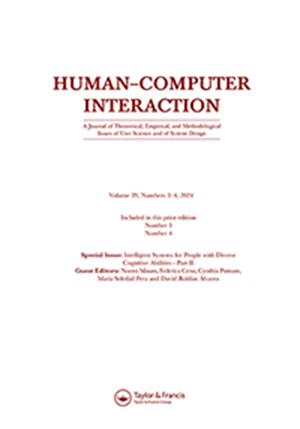How does working from home during COVID-19 affect what managers do? Evidence from time-Use studies
IF 4.4
2区 工程技术
Q1 COMPUTER SCIENCE, CYBERNETICS
引用次数: 24
Abstract
The advent of the COVID-19 pandemic has forced millions of workers to suddenly shift their activity out of their offices and into their homes: 5–15% of Americans worked from home before the pandemic, whereas 50% of the Americans who were employed pre-COVID reported working from home in April/2020 (Brynjolfsson et al., 2020). While the effects of this sudden and exogenous shift on workers’ behavior, as well as their productivity and wellbeing, are still largely unknown, organizations have already started to consider extending “working from home” (WFH) arrangements beyond the pandemic (Kelly, 2020). In this research we explore the effects of the forced WFH arrangement during the COVID-19 pandemic on managers. We assess how the sudden and widespread shift to working from home during the pandemic impacted how managers allocate time throughout their working day, and how the type and length of work activities they engage in. Managers are a particular type of “knowledge workers” – i.e. workers who typically focus on problem-solving and related cognitive tasks (Autor & Dorn, 2013). Unlike other knowledge workers whose tasks depend more on allocating one’s individual efforts and skills to conduct solo-tasks, such as writing reports or coding, the job of managers requires primarily coordinative tasks, including the supervision, evaluation, and deployment of the work of others (Drucker, 2012). We focus our study on managers for two main reasons. First, broadly, managerial work is a central enabler that allows organizations to expand and thrive in distinct markets (Chandler, 1990), and the importance of managerial occupations in the U.S. economy has grown significantly over past decades (Autor & Dorn, 2009, 2013). However, we do not yet have a detailed understanding of how a forced transition to WFH affects managers’ daily activities and the structure of their work. The need to understand these effects is made even more salient by the fact that the forced transition out of the office initiated by the pandemic will likely result in a more permanent shift toward WFH arrangements (Barrero, et al., 2021). Second, more specifically, WFH presents a challenge for team-work and social activities Lowy, (2020; Neeley, 2021), and managers are very likely to engage precisely in activities that rely on team-work and social interactions (Deming, 2017). Since coordination is such a central activity of what managers do and what organizations require, it is important to understand the extent to which a transition to WFH arrangements during the COVID-19 pandemic has affected this occupation. One method to characterize how managerial work has changed in a context of a sudden transition to WFH is to examine changes in where managers allocate their most valuable and scarce resource: their time (Mintzberg, 1990).COVID-19期间在家工作如何影响管理人员的工作?时间利用研究的证据
COVID-19大流行的到来迫使数百万工人突然将他们的活动从办公室转移到家中:在大流行之前,有5-15%的美国人在家工作,而在COVID-19之前就业的美国人中,有50%报告在2020年4月在家工作(Brynjolfsson等人,2020)。虽然这种突然和外生的转变对工人行为以及他们的生产力和福祉的影响在很大程度上仍然未知,但组织已经开始考虑将“在家工作”(WFH)安排扩展到大流行之后(Kelly, 2020)。在本研究中,我们探讨了COVID-19大流行期间强制WFH安排对管理人员的影响。我们评估了疫情期间突然而广泛地转向在家工作如何影响管理人员在工作日中如何分配时间,以及他们从事的工作活动的类型和长度。管理者是一种特殊类型的“知识工作者”——即那些通常专注于解决问题和相关认知任务的工作者(Autor & Dorn, 2013)。与其他知识工作者不同,他们的任务更多地依赖于分配个人的努力和技能来完成单独的任务,比如写报告或编码,而管理者的工作主要需要协调任务,包括监督、评估和部署他人的工作(德鲁克,2012)。我们把研究重点放在管理者身上有两个主要原因。首先,从广义上讲,管理工作是允许组织在不同市场中扩张和繁荣的核心推动者(钱德勒,1990),在过去的几十年里,管理职业在美国经济中的重要性显著增长(Autor & Dorn, 2009, 2013)。然而,我们还没有详细了解强制过渡到WFH如何影响管理者的日常活动和他们的工作结构。由于疫情引发的被迫离职可能会导致更永久性地转向WFH安排,因此了解这些影响的必要性变得更加突出(Barrero等,2021年)。其次,更具体地说,WFH对团队合作和社会活动提出了挑战(Lowy, (2020);Neeley, 2021),管理者很可能会从事依赖于团队合作和社会互动的活动(Deming, 2017)。由于协调是管理人员工作和组织需要的核心活动,因此了解在COVID-19大流行期间向WFH安排过渡对该职业的影响程度非常重要。在突然过渡到WFH的背景下,描述管理工作如何变化的一种方法是检查管理者分配他们最宝贵和最稀缺资源的变化:他们的时间(Mintzberg, 1990)。
本文章由计算机程序翻译,如有差异,请以英文原文为准。
求助全文
约1分钟内获得全文
求助全文
来源期刊

Human-Computer Interaction
工程技术-计算机:控制论
CiteScore
12.20
自引率
3.80%
发文量
15
审稿时长
>12 weeks
期刊介绍:
Human-Computer Interaction (HCI) is a multidisciplinary journal defining and reporting
on fundamental research in human-computer interaction. The goal of HCI is to be a journal
of the highest quality that combines the best research and design work to extend our
understanding of human-computer interaction. The target audience is the research
community with an interest in both the scientific implications and practical relevance of
how interactive computer systems should be designed and how they are actually used. HCI is
concerned with the theoretical, empirical, and methodological issues of interaction science
and system design as it affects the user.
 求助内容:
求助内容: 应助结果提醒方式:
应助结果提醒方式:


